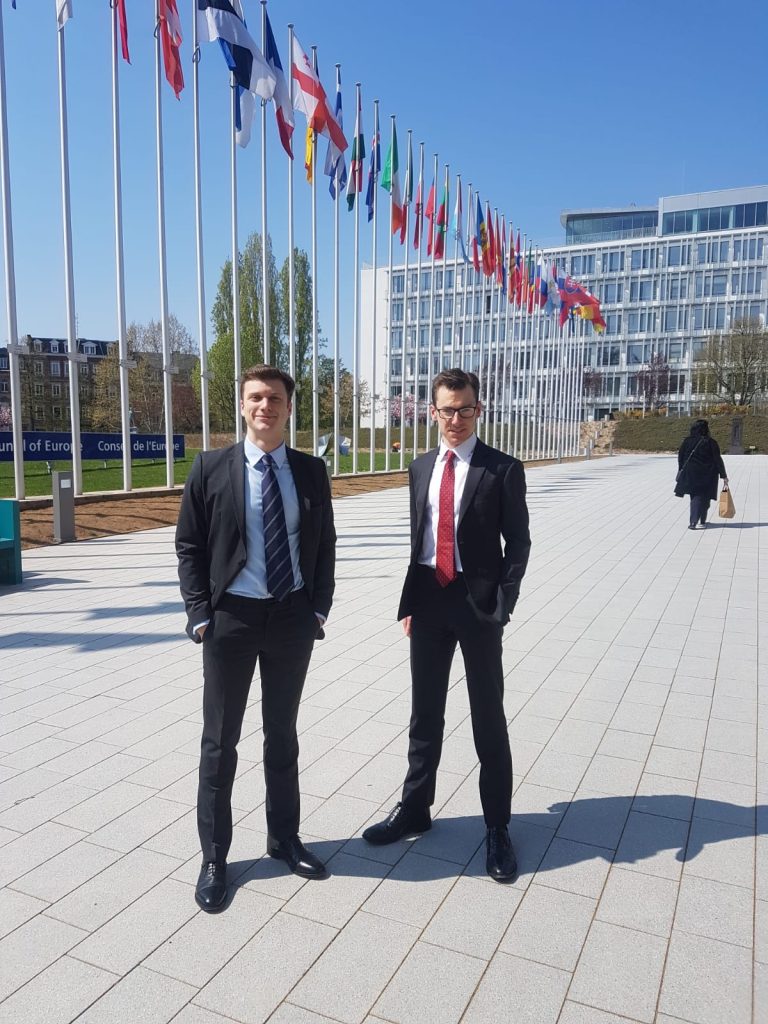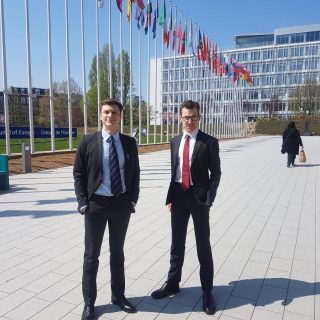What is EHRMCC?
The European Human Rights Moot Court Competition is organised annually by the European Law Students Association (ELSA) and the Council of Europe. It invites teams from universities in all member states to tackle a moot problem that is typically built around live issues and tensions in Human Rights law.
Each year, around 100 teams submit written arguments and 20 are shortlisted for the oral rounds, which (excitingly) take place at the Council of Europe and the famous ECtHR in Strasbourg. The EHRMCC draws in competitors from all over Europe and principally aims to encourage law students to realise the value of the ECHR as the guardian of the fundamental rights of all Europeans.

Last year, the moot problem concerned a woman whose ex-partner had responded to their break-up by harassing her over social media. The legal argument was largely based on the applicant’s Article 8 right to private life in an online setting, and her ex-partner’s Article 10 right to freedom of expression. In previous years the Moot has pitted student minds against some of the toughest problems facing human rights law, such as the right of a mother to deny vaccinations to her child on religious grounds (Article 8 right to private life and Article 9 right to freedom of religion) and the right of terrorist suspects with vital information not to be tortured in interrogation (Article 3 prohibition of torture and Article 6 right to fair trial).
Why enter the EHRMCC?
The Moot is excellent experience for anyone with an interest in Human Rights. If you’re dreaming of landing that pupillage at Doughty St or taking up a prestigious paralegal role at Liberty in your post-GDL gap year, the EHRMCC will give you a good talking point when you’re inevitably asked how and why you’ve demonstrated an interest in Human Rights at interview.
In researching for the written submissions stage you will learn a huge amount about an evolving and dynamic area of law. If you’re taking the GDL, your coverage of Human Rights in lectures will be brief – focused mostly on English judges’ adoption of ECHR rights through the Human Rights Act 1998 – so this is a great opportunity to get a firmer grip on the broader European context of the Court’s case law.
You will also learn a different style of advocacy to that which you may be familiar with from a UK courtroom. The experience of mooting in Strasbourg is quite grand and modern: think huge echoing halls, enormous plate-glass windows and personal microphones. The dramatic setting of the Council of Europe and ECtHR make for some good photo ops too!

The written stage
This takes time. For anyone considering entering an international mooting competition (whether this one or any other), it is vital to appreciate how long the process of researching and drafting the written submissions will inevitably take. Teams must submit arguments of around 8000 words for both the respondent and applicant and these submissions should follow the procedural style of the ECtHR, which draws subtle distinctions between the admissibility of an argument, the applicability of any Convention article or articles related to that argument, and the substantive violation of those articles. Getting a good understanding of the procedural peculiarities is important if you want to write high-quality submissions that will make the shortlist for Strasbourg.
It is helpful to divvy up the workload and to set internal deadlines within your team. Peer review is a very useful way of ironing out difficulties that arise throughout the research process.
Going to Strasbourg for the ‘Final Oral Round’
Going to Strasbourg for the oral arguments is a fantastic experience, and one that is (very kindly) planned by Emily Allbon and paid for by City. Once there, you’ll be encouraged to take part in a packed programme of events put together by ELSA, but you should by no means feel obliged to cut your mooting prep short for this. It’s good fun going to the Ambassador’s residence on the first night, but the events after that are mostly for the benefit of teams that have been knocked out.
Your 19 competitor teams will probably be quite good (last year the victors were a team of BCL and DPhil students from Oxford University), but most teams will not have the advantage of English as a first language.
Having said this, rhetorical flair and confidence will not compensate for weakness of argument. After each moot, the judges give feedback on your style of advocacy, however their assessment of your style seems to come as an afterthought to their assessment of the quality of your submissions.
Advice for future teams
When considering whether to try for the City team:
- Consider whether you have the time to commit before entering. This moot really does absorb time, which you may very understandably prefer to use for other things.
- Are you happy to allow the EHRMCC to dominate your work schedule in April, around 6 weeks before you’ll be starting exams (if you’re taking the GDL)?
When working on written and oral submissions as a team:
- Work smarter, not harder. From the beginning of your research, try to build your arguments around core concepts of the ECHR case law (margin of appreciation, proportionality, etc.)
- Go to the pre-rounds! These will take place before you find out whether you’ve made it through to the Final Oral Round in Strasbourg, but they offer an invaluable opportunity for you to practice your submissions without any binding consequences. They are an opportunity that should not be wasted, particularly because ELSA will most likely host some in London (they only host them in a few places around Europe), so the logistics of attending should be quite straightforward. Even if you do not feel ready to present your oral arguments by the time of the pre-rounds they are an excellent way of sizing up your competition. The best teams (therefore the ones that you will have to beat if you want to win) will be the ones that take advantage of the pre-rounds. You want to take part in them so you can be on top of your work by April, and aware of the quality of advocates you will be up against in Strasbourg.
- In much the same vein as the above point, make sure you start practising your oral submissions as a team as early as possible. You need to hear each other speak and feel comfortable in offering helpful constructive criticism to each other so there are no last-minute surprises.
Overall, it is a great experience and highly enjoyable. I would recommend it whole-heartedly while also cautioning would-be mooters against biting off more than they can chew.
Thanks to James Taylor for this useful write-up, aimed at helping those considering getting involved in mooting in the 2019/20 academic year. Joining James in Strasbourg last year were Felix Keating, Jack Myers and Camilla Crosby. Felix was named best orator in the Preliminary Rounds. You can read the report of the 2018/19 moot via the EHRMCC website.

